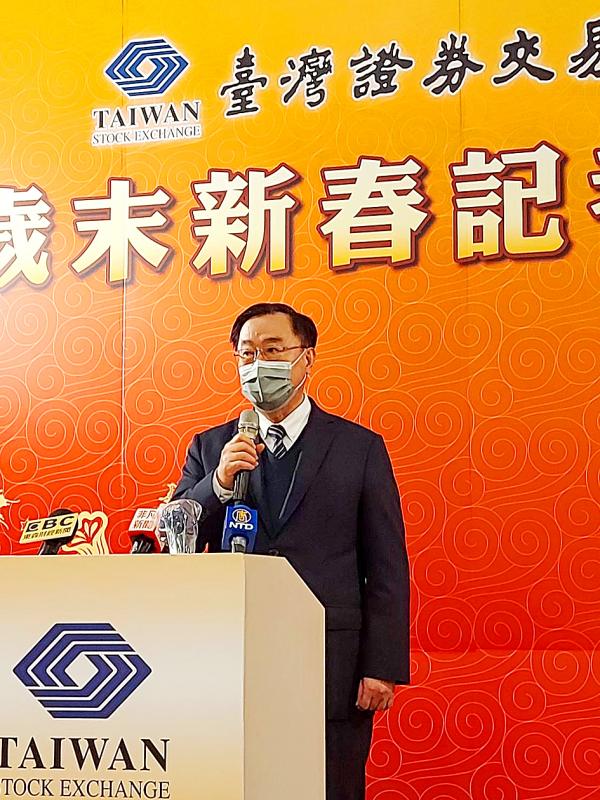The combined market value of all publicly listed companies in Taiwan grew to NT$62 trillion (US$2.24 trillion) at the end of last year, outperforming South Korean firms for the first time, Taiwan Stock Exchange (TWSE) chairman Hsu Jan-yau (許璋瑤) said yesterday.
The market value of Taiwan’s stock market ranked 16th among global bourses, Hsu said.
The combined market value of all companies listed on the TWSE grew 25 percent from NT$44.9 trillion in 2020 to NT$56.3 trillion last year, while that of all firms listed on the Taipei Exchange (TPEX) rose 31 percent to NT$5.78 trillion, exchange data showed.

Photo: Chen Yung-chi, Taipei Times
Average daily turnover advanced 95 percent annually to NT$391.4 billion, not only the highest in the local market’s history, but also the eighth-highest among global stock markets last year, exchange data showed.
Foreign institutional investors sold a net NT$454.1 billion of local shares last year, while the market cap of shares held by foreign investors to overall market value slid to 43.5 percent from 45 percent in 2020, exchange data showed.
“Although foreign institutional investors sold more than NT$1 trillion in net local shares over the past two years, local stocks still advanced, as the impact was offset by purchases by local investors,” Hsu said.
A total of 770,000 investors opened trading accounts last year, up 15 percent year-on-year, exchange data showed.
Hsu holds an upbeat outlook for local equities this year, citing their high dividend yields and low price-to-earnings ratios, and the Taiwanese economy’s expected growth of 4 percent this year.
However, there are elements of uncertainty, such as the COVID-19 pandemic, inflation and rate hikes, he added.
The TWSE would continue to seek start-ups and high-potential companies to list on the Taiwan Innovation Board, Hsu said, adding that he aims to have 10 firms listed on the new board.
Although few firms were last year interested in the new board, 30 companies applied to list their shares on the main board, the highest since 2017, he added.
The overall amount of funds raised in initial public offerings surged 198 percent from a year earlier to NT$25 billion, the highest since 2017, while funds raised in second public offerings rose 127 percent annually to NT$177.7 billion, also the highest since 2017, exchange data showed.

SELL-OFF: Investors expect tariff-driven volatility as the local boarse reopens today, while analysts say government support and solid fundamentals would steady sentiment Local investors are bracing for a sharp market downturn today as the nation’s financial markets resume trading following a two-day closure for national holidays before the weekend, with sentiment rattled by US President Donald Trump’s sweeping tariff announcement. Trump’s unveiling of new “reciprocal tariffs” on Wednesday triggered a sell-off in global markets, with the FTSE Taiwan Index Futures — a benchmark for Taiwanese equities traded in Singapore — tumbling 9.2 percent over the past two sessions. Meanwhile, the American depositary receipts (ADRs) of Taiwan Semiconductor Manufacturing Co (TSMC, 台積電), the most heavily weighted stock on the TAIEX, plunged 13.8 percent in

A wave of stop-loss selling and panic selling hit Taiwan's stock market at its opening today, with the weighted index plunging 2,086 points — a drop of more than 9.7 percent — marking the largest intraday point and percentage loss on record. The index bottomed out at 19,212.02, while futures were locked limit-down, with more than 1,000 stocks hitting their daily drop limit. Three heavyweight stocks — Taiwan Semiconductor Manufacturing Co (TSMC, 台積電), Hon Hai Precision Industry Co (Foxconn, 鴻海精密) and MediaTek (聯發科) — hit their limit-down prices as soon as the market opened, falling to NT$848 (US$25.54), NT$138.5 and NT$1,295 respectively. TSMC's

TARIFFS: The global ‘panic atmosphere remains strong,’ and foreign investors have continued to sell their holdings since the start of the year, the Ministry of Finance said The government yesterday authorized the activation of its NT$500 billion (US$15.15 billion) National Stabilization Fund (NSF) to prop up the local stock market after two days of sharp falls in reaction to US President Donald Trump’s new import tariffs. The Ministry of Finance said in a statement after the market close that the steering committee of the fund had been given the go-ahead to intervene in the market to bolster Taiwanese shares in a time of crisis. The fund has been authorized to use its assets “to carry out market stabilization tasks as appropriate to maintain the stability of Taiwan’s

In a small town in Paraguay, a showdown is brewing between traditional producers of yerba mate, a bitter herbal tea popular across South America, and miners of a shinier treasure: gold. A rush for the precious metal is pitting mate growers and indigenous groups against the expanding operations of small-scale miners who, until recently, were their neighbors, not nemeses. “They [the miners] have destroyed everything... The canals, springs, swamps,” said Vidal Britez, president of the Yerba Mate Producers’ Association of the town of Paso Yobai, about 210km east of capital Asuncion. “You can see the pollution from the dead fish.